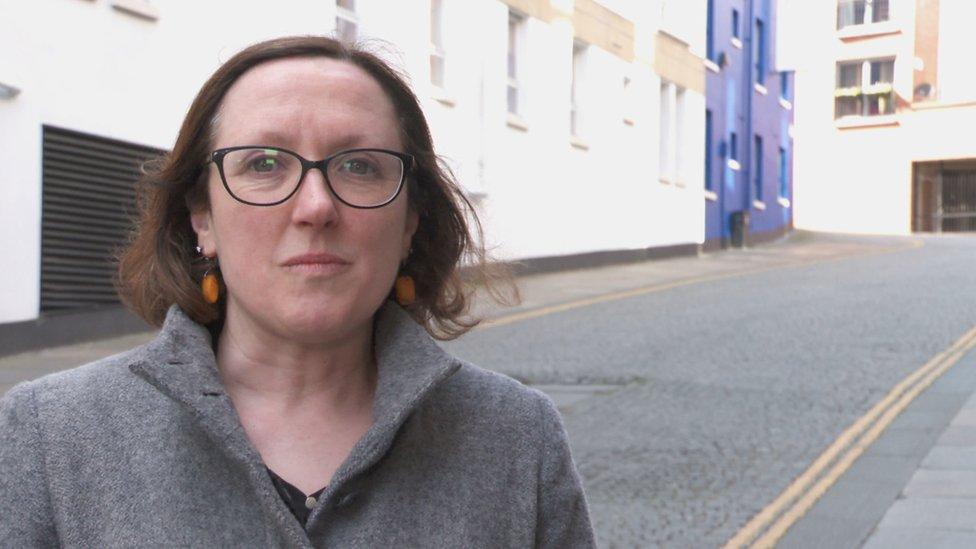Lawyers boycott domestic abuse cases in legal aid dispute
- Published

Defence lawyers across Scotland are to boycott hundreds of cases brought under ground-breaking legislation against domestic abuse.
The move marks an escalation in their long-running dispute with the Scottish government over legal aid fees.
Campaigners have warned that delays caused by the boycott could be "very dangerous" for victims.
Government ministers say they cannot afford the profession's demands for an across-the-board 50% rise in fees.
Legal aid fees were increased by 3% in 2019, 5% in 2021 and 5% on 1 April this year.
An offer of an additional 7.5% increase for criminal legal aid and 5% for civil legal aid was rejected last week. The Law Society of Scotland says the increases have been swallowed up by inflation and don't go far enough.
From 3 May, most solicitors nationwide will now refuse to take on summary cases brought under Section 1 of the Domestic Abuse (Scotland) Act 2018.
The legislation criminalised psychological domestic abuse and coercive and controlling behaviour.
In 2020-21, nearly 1,600 charges were reported under Section 1, accounting for close to 5% of all domestic abuse charges.
The vast majority went to court, with 69% brought at summary level. Summary cases are heard by a sheriff without a jury and can result in jail sentences of up to 12 months.
The defence lawyers say they will still take on solemn cases that go to trial with a sheriff and jury or in the high court.
The Scottish Solicitors' Bar Association (SSBA) says its members receive the same fee for representing someone accused of years of abusive behaviour as they would for someone accused of a single- punch assault.
The association's president, Julia McPartlin, said: "Legal aid rates were fixed about 20 years ago and have barely changed since. These tend to be cases that go on over a number of days, so that involves a great deal of preparation which the fixed fee isn't fit for."

Julia McPartlin believes the fixed fee system is outdated
Anyone facing charges under the act cannot represent themselves in court because of the nature of the case. The boycott means they will have great difficulty finding a lawyer, resulting in major delays for Section 1 summary cases.
"We fully appreciate that this is going to have a potential impact on victims as well as other witnesses and the accused people themselves," said Ms McPartlin. "The vast majority of faculties across Scotland have signed up to this boycott because we really feel that the profession is in crisis."
Anger over fees and funding during the pandemic has already resulted in some defence lawyers boycotting court appointments, duty schemes and holiday courts, although the picture varies across the country.

How does legal aid work?

Legal aid is the money provided by the government to cover legal costs for people who can't afford them.
Criminal legal aid is generally available if the situation is serious (for example, if the person is convicted they will have to go to prison or will lose their job), and if the person can't afford to pay for legal representation for themselves.
Most people appearing in court on criminal charges rely on a defence solicitor who is paid through legal aid.
Usually, these solicitors work for private firms. The firms sign up to a rota and whichever solicitor is on duty will be available to a defendant needing representation.

The Scottish government's community safety minister, Ash Regan, said ministers were committed to reforming legal aid.
But she said the 50% increase sought by the Law Society would cost £60m a year.
"I think you could always look back and say things should have been done differently," she said. "What I would say is that since I've been in post, I've given consistent fee rate rises. I have listened to what the profession has said.
"This is a serious escalation. There are real victims that are going to be impacted by this. So I want to send out that message that the government is willing to carry on talking to see if we can find a resolution to this."
The chief executive of Scottish Women's Aid expressed some sympathy for lawyers, but said delays to Section 1 cases could be "very dangerous." The system already faces a huge backlog exacerbated by the pandemic.
"The commercial model is not fit for purpose," said Marsha Scott. "Witness attrition is going through the roof. Women are walking away from cases. They will be walking away from calling the police unless they are absolutely desperate."
Abusive calls and notes
Last week, Paisley Sheriff Court dealt with a vivid example of the kind of case that will be affected by the boycott.
Douglas Trotter was convicted of subjecting his partner to threatening and abusive behaviour.
The 66-year-old, from Giffnock, hid raw fish in her home, changed the locks, removed screws from tables and chairs to make them dangerous, placed matches in a toaster, made abusive calls and left abusive notes.
The Crown Office and Procurator Fiscal Service commended Trotter's victim for having the courage to come forward.
He was sentenced to 240 hours of unpaid work and banned from approaching or contacting his former partner for two years.